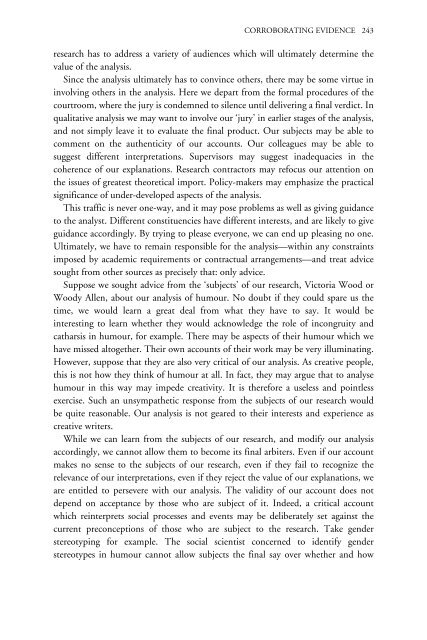Qualitative_data_analysis
Qualitative_data_analysis
Qualitative_data_analysis
Create successful ePaper yourself
Turn your PDF publications into a flip-book with our unique Google optimized e-Paper software.
CORROBORATING EVIDENCE 243<br />
research has to address a variety of audiences which will ultimately determine the<br />
value of the <strong>analysis</strong>.<br />
Since the <strong>analysis</strong> ultimately has to convince others, there may be some virtue in<br />
involving others in the <strong>analysis</strong>. Here we depart from the formal procedures of the<br />
courtroom, where the jury is condemned to silence until delivering a final verdict. In<br />
qualitative <strong>analysis</strong> we may want to involve our ‘jury’ in earlier stages of the <strong>analysis</strong>,<br />
and not simply leave it to evaluate the final product. Our subjects may be able to<br />
comment on the authenticity of our accounts. Our colleagues may be able to<br />
suggest different interpretations. Supervisors may suggest inadequacies in the<br />
coherence of our explanations. Research contractors may refocus our attention on<br />
the issues of greatest theoretical import. Policy-makers may emphasize the practical<br />
significance of under-developed aspects of the <strong>analysis</strong>.<br />
This traffic is never one-way, and it may pose problems as well as giving guidance<br />
to the analyst. Different constituencies have different interests, and are likely to give<br />
guidance accordingly. By trying to please everyone, we can end up pleasing no one.<br />
Ultimately, we have to remain responsible for the <strong>analysis</strong>—within any constraints<br />
imposed by academic requirements or contractual arrangements—and treat advice<br />
sought from other sources as precisely that: only advice.<br />
Suppose we sought advice from the ‘subjects’ of our research, Victoria Wood or<br />
Woody Allen, about our <strong>analysis</strong> of humour. No doubt if they could spare us the<br />
time, we would learn a great deal from what they have to say. It would be<br />
interesting to learn whether they would acknowledge the role of incongruity and<br />
catharsis in humour, for example. There may be aspects of their humour which we<br />
have missed altogether. Their own accounts of their work may be very illuminating.<br />
However, suppose that they are also very critical of our <strong>analysis</strong>. As creative people,<br />
this is not how they think of humour at all. In fact, they may argue that to analyse<br />
humour in this way may impede creativity. It is therefore a useless and pointless<br />
exercise. Such an unsympathetic response from the subjects of our research would<br />
be quite reasonable. Our <strong>analysis</strong> is not geared to their interests and experience as<br />
creative writers.<br />
While we can learn from the subjects of our research, and modify our <strong>analysis</strong><br />
accordingly, we cannot allow them to become its final arbiters. Even if our account<br />
makes no sense to the subjects of our research, even if they fail to recognize the<br />
relevance of our interpretations, even if they reject the value of our explanations, we<br />
are entitled to persevere with our <strong>analysis</strong>. The validity of our account does not<br />
depend on acceptance by those who are subject of it. Indeed, a critical account<br />
which reinterprets social processes and events may be deliberately set against the<br />
current preconceptions of those who are subject to the research. Take gender<br />
stereotyping for example. The social scientist concerned to identify gender<br />
stereotypes in humour cannot allow subjects the final say over whether and how



